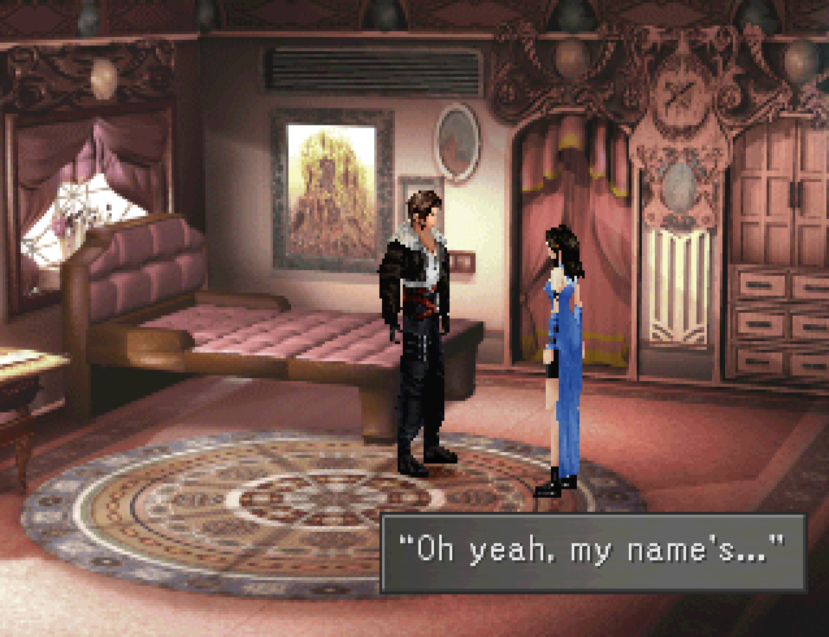The first seven numbered Final Fantasy games let you name your characters. Final Fantasy VIII is the first one that in the series, for the most part, doesn’t.
Going back to Final Fantasy I (or just plain-old Final Fantasy, as some of us call it who didn’t buy any other games in the series until FF7), getting to name your characters was a core feature of the series. It seems to have been born out of the franchise’s roots as a Dungeons & Dragons-inspired role-playing game, copying many of the traits of other foundational digital RPGs inspired by tabletop games, like Wizardry and Ultima. As with those games, in Final Fantasy I, you created your own party by selecting the classes of your characters and giving them names. If you’ve ever played a dungeon crawler — or one of the games that falls into the broad bucket of what people still insist on calling “CRPGs” — this is a familiar and somewhat old-school setup.
That’s a tradition that the series broke almost immediately, but the vestiges of those old systems stuck around for a decade. Starting with Final Fantasy II (the actual Final Fantasy II), the games began to have individual, distinct characters. Final Fantasy IV (or Final Fantasy II, as I never called it because I didn’t buy any Final Fantasy games for SNES) took that a step further by giving your characters dialogue and personalities that drove that story, rather than being blank avatars for the player. You weren’t just a generic RPG hero with an assigned name. Now you were Cecil and Kain and Rosa.
Despite these changes, you could still name your characters. Even when they had distinct personalities. Even when the cast ballooned to fourteen freaking characters in Final Fantasy VI (a decision I’m still not a fan of). When I played Final Fantasy VII for the first time, I named Cloud “Grey” for reasons that are still unclear to me. That was fair game!
There were a few notable exceptions. Temporary party members who serve a function elsewhere in the plot could not be named. Golbez cannot be named in Final Fantasy IV. Sephiroth cannot be named in Final Fantasy VII. In some cases, you can’t change their equipment or even control them directly. These are not your characters. They’re along for the ride, but you are not them. You are the characters whose names you got to pick out. The ones whose abilities you have control over.
Then came Final Fantasy VIII. You can name your characters as well, but ONLY Squall and Rinoa, the two main characters. This always struck me as weird, because you can name your GFs and other ancillary characters like Angelo the dog, or CONCEPTS like Griever, yet you can’t name Selphie, Zell, Irvine, or Quistis.
That’s because they are not your characters. Unlike Golbez and Sephiroth, they’re not temporary, but this story is not about them. This is Squall and Rinoa’s love story. They are the focus. The game is told from their perspective (or Squall’s specifically). They get the most characterization. They are the characters you should be identifying with.
I don’t know how this was received at the time, but it’s a yet another long-standing Final Fantasy tradition that FF8 broke. I get the sense that this might not have been the development team’s decision from the outset, because every other player character is conspicuously not named until there’s a break in dialogue when you could hypothetically have put their name in. Selphie is a blatant example, because despite having minor interactions with her earlier in the game when she could’ve introduced herself, you don’t actually learn her name until the moment she joins your party, a moment when they could have let you name her, but didn’t.
Beyond the specific application of this design change to FF8, it also marks a sign that the Final Fantasy series was fully embracing what it had become. For two (arguably three) games in a row, the series had ditched its sword-and-sorcery roots and gone for something more lavishly futuristic and fantastical, more dramatic, serialized, and narrative-driven. Combat had evolved from a pen-and-paper-style system into something faster and more ostentatious. Turn-based was out, real-time was in. Consider that FF8 has a mechanic where you have to rapidly button-mash during summon animations, a far cry from FF1 where the game is so rigid that your characters won’t attack a different enemy if the one they’ve targeted has already died.
By 1999, Final Fantasy had become its own thing, and even the smallest design choices showed a willingness to break with the past. When a good story-driven reason came up, Square ditched a game mechanic that had been around from the beginning, but that hadn’t mattered since Final Fantasy III (the real one). FF7 might have made the franchise’s splashiest reinvention, but FF8 showed the series confidently committing to the new path it laid for itself.
Of course, there’s a practical reason that nameable characters were abandoned for good. Even though Final Fantasy IX went back to letting you name the whole cast, Final Fantasy X introduced voice-acting to the series, and as 11-year-old Phil rightly recognized when he read that in a magazine for the first time, there’s no way you would be able to name every character and have full voice-acting at the same time.
At least in the case of Final Fantasy VIII, not letting the player name most of their party was a voluntary decision, one that helps shape the direction of the game. You are Squall and Rinoa. This is their story. And if you didn’t name them after yourself and your crush, you blew it.

